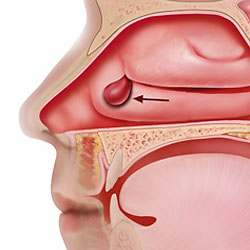Nasal polyps are small, soft growths in the nose. They are very common, occurring in roughly 30 percent of American adults. Unless polyps become large and block the nose, they frequently do not cause any problems. While it is not clear what causes nasal polyps, they are more common in patients who have allergies and/or asthma. Some cases of nasal polyps run in families.
The most common symptoms from nasal polyps are:
- Decreased (or absent) sense of smell
- Difficulty breathing through the nose
- Nasal airflow blockage

Polyps that occur in children require an evaluation for the presence of cystic fibrosis or a problem with the cilia that line the nose and sinuses. Cilia are tiny, hair-like structures that help remove irritants from the air we breathe.
Medical treatment for nasal polyps may include:
- Antibiotics
- Steroids
- Medicated nasal sprays
- Nasal saline lavages / Nasal irrigation
- Treatment of allergies and/or asthma (if present)
If the nasal polyps are not causing any symptoms, then no treatment is required, except maybe a nasal steroid spray, which keeps the polyps from growing. Nasal polyps that occur on both sides of the nose rarely have the potential to be cancerous. Nasal polyps may be removed if:
- They are completely blocking the nose
- Are associated with persistent or recurrent sinus infections
- Medication does not eliminate symptoms
Due to the chronic inflammatory nature of nasal polyps, over 80% of nasal polyps will return after they are removed. Continuing medical therapy will prevent polyps from growing. Patients with a history of nasal polyps should follow up with their physicians about every 6 to 12 months. Because of the tendency of nasal polyps to recur, it is not uncommon for patients with nasal polyps to require revision sinus surgery at some point in their lives. Frequently, with directed medical therapy and regular follow-up, the need for revision sinus surgery can be dramatically reduced.
At the Raleigh Capitol Sinus & Allergy Center, our experienced surgeons will promptly evaluate your condition. After a thorough evaluation, our surgeons will discuss treatment options with you and help you decide which treatment option is best for you. If surgery is needed, our surgeons will use the latest techniques to safely and effectively perform your surgery.
For an appointment, contact us.
